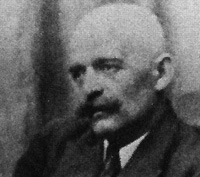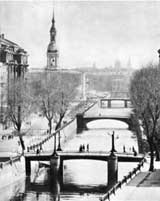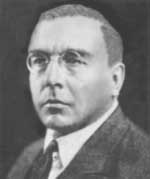G.I. Gurdjieff
Gurdjieff Introduces the Teaching
of The Fourth Way to the West

Recognizing that humanity had entered a precarious period and that the West needed a major shock if it was not to destroy itself, Gurdjieff took a vow to introduce and establish the teaching of The Fourth Way in the West. He took a special oath on September 14, 1911, binding him for twenty-one years, "to lead in some ways an artificial life, modeled upon a program which had been previously planned in accordance with certain definite principles."
His plan was to recruit students of a high caliber, form them into groups, and then open an Institute from which to propagate the ideas. Gurdjieff chose Russia from which to introduce the teaching to the West. He arrived in St. Petersburg in 1912; it was the most cultivated and cosmopolitan city of Russia and its capital. He came with over a million in rubles, rare carpets and two collections of Chinese cloisonné. It was a vast sum—all of which he had earned himself. Why bring so much money and valuables? He wanted to be dependent on no one—to have no one interfere with the establishing of the teaching. There are many misunderstandings concerning how Gurdjieff used money to awaken his students. Read "Gurdjieff and Money."

There is some indication, though not conclusive, that Gurdjieff might have posed as a Turkish prince—a certain "Prince Ozay"—in order to gain entrance to the court at the Winter Palace, the home of all the Russian Tsars. (Read "Is 'Prince Ozay' Really Gurdjieff?") However that may be, he did marry an attendant to the court, the Polish countess Julia Ostrowska. Born in 1889 in Poland and an attendant to the Russian court, she apparently met Gurdjieff at court. It is not clear when they married, but she was his constant companion from 1917 (and perhaps before) until her death on June 26, 1926, at the Priéure.

He was not successful in recruiting students and after a year or so, left for Moscow where he did form groups. He met P. D. Ouspensky in April 1915 in Moscow. As Ouspensky was living in St. Petersburg, a 350-mile journey by train, he had Ouspensky recruit
and form a group for him in St. Petersburg. Ouspensky would become a close student during Gurdjieff's Russian period and the chief interpreter of the Russian period of his teaching. He left Gurdjieff a number of times before finally breaking away in 1924. A detailed chronicle of Gurdjieff's relationship with Ouspensky—including the never-before-known "St. Petersburg Conditions," the reason for Ouspensky's leaving which Ouspensky deleted from his book In Search of the Miraculous—is given in William Patrick Patterson's Struggle of the Magicians, Also, see the video Gurdjieff's Mission and The Gurdjieff Journal article "The Life & Legacy of P. D. Ouspensky."
Following his meeting with Gurdjieff in Moscow, Ouspensky returned to St. Petersburg. He went to the Stray Dog an underground cafe frequented by the city's intelligentsia. Located on Mikhail Louskaia Square, the cellar cafe was opened in 1911 and closed by authorities in 1915. It was the favorite meeting spot of the city's artists, actors, writers, poets and musicians, and others who were known as "pharmacists," the bourgeois onlookers who had to pay to get in. The cafe regularly held poetry and prose readings, dance performances and plays. It was described as "smelling of sweating bodies and stale smoke." In February 2001 this legendary cafe reopened and quickly attained its former prominence.
Here Ouspensky met his companion of the time Anna Ilinishna Butkovsky. Without pausing for a formal greeting or even stopping to sit down, Ouspensky declared to Butkovsky, "I have found the Miracle!"